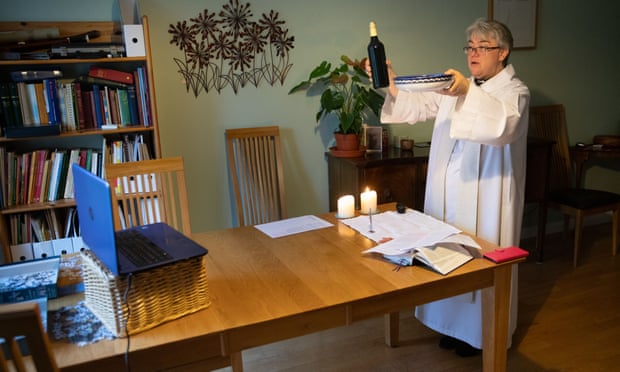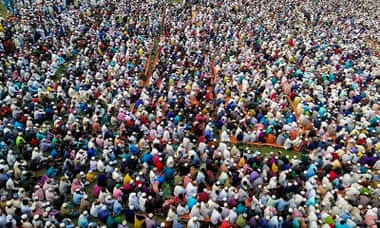Anglican vicars are not the only spiritual guides fighting curbs imposed on worship, with many flouting their government’s rules as more people seek solace in religion
This article was first Published on Sun 12 Apr 2020 at – : http://bit.ly/37CDczX
HARRIET SHERWOOD

Members of the Church of England are not noted for their resistance to authority. But during Holy Week, the most significant time in the Christian calendar, its leaders have faced mounting objections to its edict that all churches must close – even to their own clergy.
Some prominent Anglicans have taken to social media and blogs this Easter to argue that churches must remain open, and that to lock their doors is to risk people’s spiritual health. Even Sarah Mullally, the bishop of London – a former nurse, and number three in the C of E’s hierarchy – suggested in a letter to parishes that vicars could live-stream services from their church buildings… before correcting herself on Twitter.
Justin Welby, the archbishop of Canterbury, was forced to restate the reasons for church closures in a Facebook video last week. In a tone of rebuke, he said the church must “set an example”.
All this was just a minor example of people of faith insisting on their right to worship in traditional ways in the face of near-global paralysis. Some of the most extreme have claimed they have divine protection, that the virus is God’s punishment for the sins of the world, or that it is a sign of the end of days.
Perhaps the first example of religious organisations elevating their right to worship above the right of others to health came in mid-February in the South Korean city of Daegu. More than 1,000 members of the Shincheonji Church of Jesus prayed shoulder to shoulder in a windowless basement. In the congregation was a 61-year-old woman with a sore throat and a fever.
Three days later, she became Patient 31, the 31st person in South Korea to test positive for Covid-19. By 1 March, some 2,200 cases – then about three in five of South Korea’s total – were traced back to the church.
In the following weeks, as wave after wave of countries announced restrictive measures, evidence grew of resistance among some religious groups and organisations. In Bangladesh, at least 10,000 – some estimate 30,000 – Muslims gathered for a mass prayer session in the town of Raipur on 18 March. A religious leader in the town told people that, following the prayers, they would now be “free from the coronavirus”.

A couple of weeks earlier, 16,000 people attended a four-day Islamic conference at the Sri Petaling mosque near the Maylasian capital, Kuala Lumpur. About 1,500 were from other countries, including China and South Korea. More than 400 coronavirus patients in Malaysia were later linked to the conference – and other cases in Brunei, Singapore, Cambodia and Thailand were traced back to the mosque meeting.
Friday prayers became a point of tension in Pakistan and Bangladesh, across the Middle East. The religious obligation for Muslim men to go to the mosque for noon prayers on Friday ran up against lockdown restrictions, despite the reassurance of imams and Islamic scholars that these were exceptional circumstances.
In Israel, the UK and the US, ultra-Orthodox Jewish communities celebrated Purim on 9 and 10 March. People gathered in large numbersbut within days, rabbis and communal leaders were advising synagogues and yeshivas (religious schools) to close.
After the Israeli government’s lockdown regulations were flouted, the entire city of Bnei Brak was barricaded, with 1,000 police officers blocking the movement of its ultra-Orthodox residents. And In New York, police broke up three ultra-Orthodox funerals last weekend.

In Stamford Hill, north London, home to a large ultra-Orthodox population, cars toured the streets, broadcasting the message about closures. A letter, signed by 20 Jewish doctors and circulated to the community, said: “You are fully responsible for deaths that occur as a result of ignoring this advice.” Communal leaders in the UK have since raised concerns about what appears to be a disproportionately high number of deaths among Jews. According to the Board of Deputies, 152 Jews had died of Covid-19 by last Wednesday – 2.77% of the total UK death toll at that time. Jews make up 0.4% of the country’s population.
In the US, churches in Florida, Ohio, Kentucky and Louisiana have continued to hold services, with some states offering limited exemptions from restrictions for faith organisations. Rodney Howard-Browne, a pastor in Tampa was arrested after his megachurch hosted acts of worship attended by hundreds of people.
Amid these tensions, faith leaders in the UK say they have been taken aback by the numbers of people tuning into online worship and prayer – far more than turn up in person. Virtual services are “meeting a deep spiritual need”, said Helen-Ann Hartley, the bishop of Ripon. “People are asking big questions about Covid-19 – why now, why us, what does this mean for my life?”

This month, as the world’s major religions celebrate significant festivals – Easter, Passover, Ramadan and Vaisakhi – in isolation, the test of faith is set to intensify.
